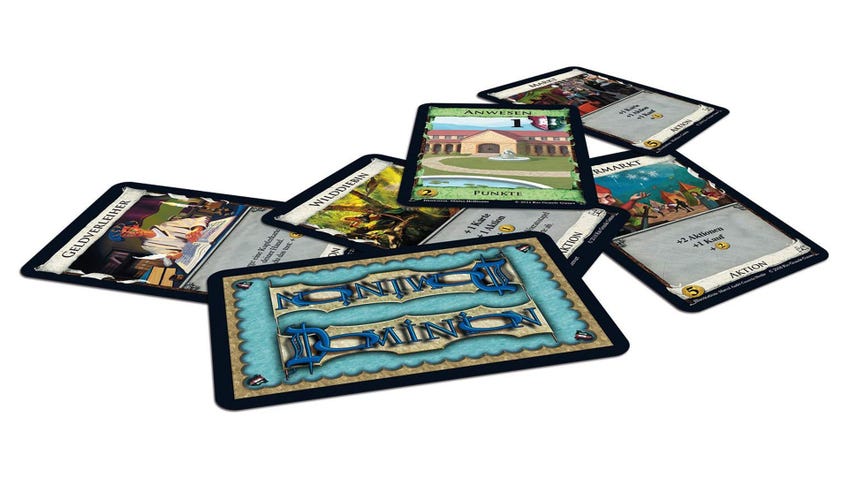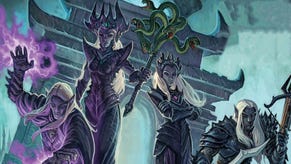How deckbuilding in Dominion helped me find real-life happiness
You play the cards you’re dealt.
For years, business gurus have been using Sun Tzu's Art of War as a template for business strategy. But I am not a warrior, I am a board gamer. So I pull my strategic inspiration not from Sun Tzu, but from Dominion.
Dominion is actually a lot like life. Dominion is a deckbuilding card game where, rather than drawing from a random or pre-constructed deck of cards, you start out with basic currency and slowly buy and add cards to your personal deck, thereby controlling what you will be drawing as the game continues. Whatever cards you add become part of your deck, and you will draw them repeatedly. Your life is likewise constantly evolving, and you are the one who chooses what things will be in it. Whatever you add to your life will come up repeatedly, like a meatball sandwich when you have acid reflux.
If you haven't played Dominion, you should, because it's the grand-pappy of the whole deckbuilding genre. One of the first things you realise after a few games is that you need to add more money to your deck early on. Whoever ends the game with the most victory points in their deck wins, but if you just buy an Estate card every turn to add one point to your deck, you'll probably never draw enough money to afford a three-point Duchy, let alone a six-point Province. That's why one of the strongest plays you can make early on is to buy Silver, which offers twice the buying power of the Copper you start with, so you can afford the big sources of points rather than the small ones.
Life is similar. Right out of college, I was focused on happiness, and failed to add any income to my life. It will not surprise you to learn that I quickly ran out of money, and had to pick up a job that not only had a lousy rate of income, but also severely penalised my happiness. (Turns out, just because you like reading books doesn't mean stocking shelves at a bookshop will be fun.) I eventually got a better job and then, once I was more financially stable, I was in a much better position to focus on happiness instead of money.
Life has plenty of its own Curses worth negative happiness points, from uncomfortable desk chairs to people who constantly make you feel bad about yourself.
The biggest thing I've learned from Dominion is deck thinning. In a game about buying cards, getting rid of cards might seem counter-intuitive. But your goal is to improve your deck and, while adding good cards is one way to do that, removing bad cards is just as effective. Obviously you want to remove Curse cards worth negative victory points, but you might also want to remove those Estates even though they're worth a point, or trash some of that Copper, even though it lets you buy things.
If you've ever played a Chapel-based deck in Dominion, you know how powerful this strategy can be. I have played games of Dominion where I trashed my entire starting deck, until most of my deck was cards that gave me more cards, more actions and more money. Every turn I'd play my whole deck and buy a Province, which led to my decisive victory. Clearly, this was a strategy I needed to harness for my own life.
Life has plenty of its own Curses worth negative happiness points, from uncomfortable desk chairs to people who constantly make you feel bad about yourself. The sooner you can trash these from your life, the better. Even the ancient Greek philosopher Epicurus realized that one of the best ways to increase the average pleasure of your life is simply to avoid pain.

The trickier strategic leap to make is not only removing Curses, but removing Estates. Some things in life, even though they provide a little happiness, prevent you from spending more time on what matters.
I noticed that a lot of my media consumption was not intentional, but just a default. If you're sitting in front of the TV and just flipping channels, or playing mindless games you have no real interest in just to pass the time, that has a pretty low rate of happiness return. If you can get rid of that, you can make space for better sources of happiness - even if it’s just better TV and better games.
Which is not to say I never play mindless games any more, because I absolutely still do. But now when I catch myself doing so, I remind myself that I have a library filled with better games I'd enjoy more. Yes, there's a small dopamine hit from matching the candy or clicking the cookie, but if I stop spending time on that, I'll free up more time for bigger dopamine hits from settling in for an epic RPG, playing board games with friends or earning money so I can continue to afford my weekly sushi habit.
I firmly believe there are plenty more lessons to be learned from the board games we play. Next time you come across a killer strategy while gaming, take a second to consider the possible applications to your own life.



